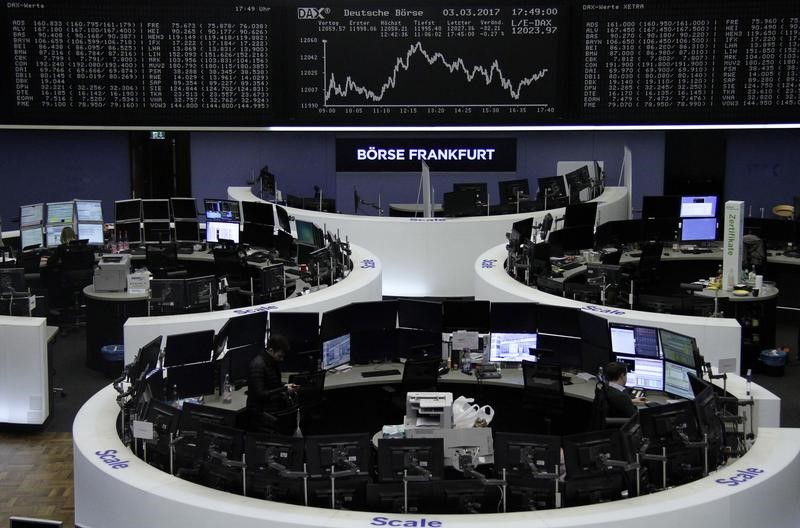By Jamie McGeever
LONDON (Reuters) - European stocks fell for a third consecutive day, dragged lower by financials as shares in Deutsche Bank slid further after its $8.5 billion cash call, while expectations of higher U.S. interest rates supported the dollar.
Wall Street was expected to open lower, according to stock index futures, cooling from last week's record highs as investors prepare for an all-but-certain Federal Reserve rate rise next week.
In Europe, a batch of weak corporate earnings and the biggest fall in German industrial orders since the depths of the global financial crisis added to the downbeat mood.
Europe's leading index of the top 300 shares fell as much as 0.2 percent (FTEU3), having earlier fallen as much as half a percent. The region's banking index (SX7P) fell 1 percent.
Shares in Deutsche Bank (DE:DBKGn), which has been hit by hefty legal penalties including for the sale of toxic U.S. mortgage debt, fell almost 3 percent to a fresh 2017 low and were down 2 percent by 1240 GMT.
"Weak German industrial orders suggests it's not a one-way ticket in Europe – there's been a lot of bullishness around European equities lately but maybe this is a sign it's not all positive. Deutsche Bank is not helping either," Neil Wilson, senior market analyst at ETX Capital, said.
British temporary power provider Aggreko (L:AGGK) fell nearly 14 percent and French retailer Casino Guichard (PA:CASP) fell 5 percent after their results.
German industrial orders slumped 7.4 percent in January, the biggest fall since January 2009 and nearly three times as steep as the 2.5 percent fall expected by economists.
MSCI's broadest index of Asia-Pacific shares outside Japan (MIAPJ0000PUS) rose 0.5 percent, and Japan's Nikkei (N225) closed down 0.2 percent.
DOLLAR UP
The dollar rose 0.2 percent against a basket of peers. (DXY)
A Fed rate hike is almost fully priced into financial markets, so the dollar and U.S. bond yields might be vulnerable to a correction.
But investors saw enough room to push the greenback and yields higher on Tuesday, lifting the 10-year yield for the fifth day in a row back above 2.50 percent (US10YT=RR) and the two-year yield up a basis point to 1.32 percent (US2YT=RR).
Sterling fell a third of a percent to a seven-week low of $1.2183
Britain's House of Lords will try on Tuesday to force the government to give lawmakers a greater say over the terms of Britain's exit from the European Union and final approval of an eventual deal with the bloc.
Analysts at Morgan Stanley (NYSE:MS) said they expect the pound to snap back as high as $1.45 by the end of next year.
"Sterling looks increasingly cheap in a historical context and our FX strategists (have) recently turned more bullish on the currency, targeting $1.28 for year end and $1.45 by the end of 2018," they wrote in a note.
The euro dipped 0.1 percent to $1.0570 <EUR=> and the dollar was marginally stronger against the yen at 113.97 yen <JPY=>.
"If you had told me (two weeks ago) expectations for a March hike would reach almost 100 percent I would have said we would have been well below $1.05," Niels Christensen, a strategist with Nordea in Copenhagen, said.
Comments overnight by Trump administration trade adviser Peter Navarro pulled attention back to concerns over the White House's attitude to trade and the dollar as officials prepare for Group of 20 meetings later this month.
Navarro said on Monday that the $65 billion U.S. trade deficit with Germany was "one of the most difficult" trade issues, and that bilateral discussions were needed to reduce it outside of European Union restrictions. (Full Story)
The U.S. publishes trade balance figures on Tuesday
In commodities, U.S. oil (CLc1) rose 0.5 percent to $53.46 a barrel, following Monday's 0.2 percent drop, and Brent crude rose 0.3 percent to $56.27 (LCOc1).
Gold slipped 0.2 percent to $1,223 an ounce <XAU=>.
Should you invest $1,000 in DBKGn right now?
Don't miss out on the next big opportunity! Stay ahead of the curve with ProPicks AI – 6 model portfolios powered by AI stock picks with a stellar performance in 2024.
Unlock ProPicks to find out